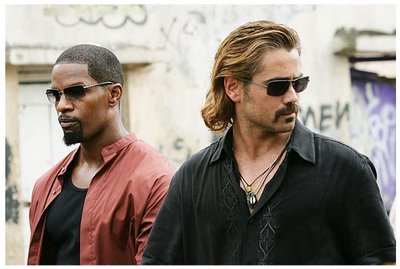I'm reading various pieces (example here) about Colin Farrell having a mullet hairdo in Michael Mann's Miami Vice. I give credit to AP Movie Critic Christy Lemire for at least leaving the question open for debate: "The most striking style statement is Farrell's hair: You'll sit there mentally debating, is that a mullet or not?" It's funny—I found myself doing exactly that at various times during the first part of the movie. Lemire doesn't answer the question, but I will.
It's not a mullet, it only looks like one. A mullet, as most everyone knows, is a haircut that's short on the top and long in the back. Colin Farrel's hair in Miami Vice is long in the back and...long on top. Possibly with extensions adding to the length. But it stays straight and controlled on top, and gets curly and wider in the back, so that's where the confusion comes in.
Does the question merit that much attention? Probably not. But there you go.
As always, I couldn't help admiring Michael Mann's skills as a filmmaker. Like Collateral, he's made a movie that has more style than substance (Heat and The Insider had both in equal measures), but Miami Vice tops Collateral on style, even if it's the other way around, slightly, on story. Miami Vice sets a sustained, coherent tone, and it's clearly not meant to matter whether or not we are always cognizant of the who what and why of everything that is going down.

It's not a mullet, it only looks like one. A mullet, as most everyone knows, is a haircut that's short on the top and long in the back. Colin Farrel's hair in Miami Vice is long in the back and...long on top. Possibly with extensions adding to the length. But it stays straight and controlled on top, and gets curly and wider in the back, so that's where the confusion comes in.
Does the question merit that much attention? Probably not. But there you go.
As always, I couldn't help admiring Michael Mann's skills as a filmmaker. Like Collateral, he's made a movie that has more style than substance (Heat and The Insider had both in equal measures), but Miami Vice tops Collateral on style, even if it's the other way around, slightly, on story. Miami Vice sets a sustained, coherent tone, and it's clearly not meant to matter whether or not we are always cognizant of the who what and why of everything that is going down.


